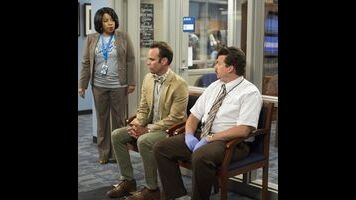If those who can’t do, teach, then it stands to reason that many principals also have stymied ambitions. These school officials must first pay their (union) dues as educators before moving on to administration. But does that ascension fulfill those deferred dreams? That’s one of the central questions of HBO’s Vice Principals, the latest dark comedy from Jody Hill and Danny McBride.
In tone and setting, it’s a spiritual sequel to their previous premium-cable outing, the mostly uproarious Eastbound & Down. There’s even a blustering man-child at the center of the story. But while the profanity reliably reaches virtuosic levels, it rarely does so at the cost of more meaningful discussion. What Hill and McBride end up with, after the LSD-laced shenanigans, is as much a meditation on disillusionment with life as it is a clash of would-be titans.
Fans of the duo who watched the trailers ahead of the premiere needn’t worry that Vice Principals ignores the first word in its title. The central conflict starts off just as it’s framed in the teasers, complete with Bill Murray cameo. A power vacuum is created when Murray’s principal character steps down to look after his ailing wife, giving his two assistants, Neal Gamby (McBride) and Lee Russell (Walton Goggins), even more reason to plot the other’s demise. Their verbal sparring inspires a lot of raucous laughter, naturally. McBride is a master of profanity, but he’s matched by Goggins, who has an uncanny ability to turn “eat shit” into a four-syllable phrase that nonetheless rolls right off his tongue.
The two men may be too distracted by their quest for power to recognize it, but the fact that they consider each other their only competition for the job speaks to an unspoken respect between the men. Gamby and Russell’s differences are highlighted early on, suggesting (falsely) that there’s only room for one of them in this school district. As Lincoln High’s lone disciplinarian, Gamby is brusque yet fussy; he punishes students for even the most minor infractions, with a steady stream of obscenities to narrate the penalties. He may like his avuncular boss, but he’s not interested in adopting his management style—Gamby seeks to rule the school with an iron fist. And he’s just as hard-nosed and judgmental in his personal life; during a talk with his remarried ex-wife (Busy Philipps), Gamby admits that his inordinately high expectations of others invariably drive them away.
Russell, a drawling dandy who favors pastels and sweater vests, is far more diplomatic—but less trustworthy. He’s the vice principal of curriculum, which turns out to be the perfect position for him. Russell is only tangentially involved in the students’ education. He’s there for the broad strokes, even auditing classes, but he doesn’t have to make sure any of the information is actually absorbed—that’s up to the teachers. He adorns himself with plausible deniability along with bowties, which is what bothers Gamby the most (aside from the incessant insults).
Their opposing views on discipline and guidance resembles a good cop-bad cop dynamic, but Russell and Gamby are really more like divorced parents. One is fun-loving and permissive, while the other must keep everyone on task. Russell is ostensibly responsible for the minds of the students—he’s also got dibs on their hearts—while Gamby’s focused on preventing their corruption. But neither is a full-time “guardian,” in or out of school. Gamby shares custody of his teenage daughter, and must endure having her exposed to her stepfather’s (an agreeably dopey Shea Whigham) influence. Russell’s married without children, but an irascible in-law prevents him from having full reign of his home.
Those personal inadequacies fuel their professional aspirations, and the principalship becomes the means to diverging ends. Gamby and Russell both seek respect, but Russell needs it. And Russell’s status as faculty favorite is something his competitor envies, even as he does everything in his power to keep the teachers (all except the prettiest one) at a distance.
With so much riding on it, Vice Principals could prolong the announcement of the successor, but the show instead draws out the suspense on just what the spurned men will do to their common enemy. They initially have very different approaches to working under Dr. Belinda Brown (Kimberly Hebert Gregory), with Gamby relying on the rules and Russell on his charm. But there’s a reason why Dr. Brown, an award-winning principal from Pennsylvania, was appointed. She’s genial, savvy, and, as a single mother, accustomed to being responsible for the welfare of others. Though her vice principals would be loath to admit it, this outsider is a great candidate for the job.
Dr. Brown isn’t without her shortcomings, though. She may recognize that Gamby’s zero-tolerance policy has netted few positive results, but her sense of superiority over that burnt-out administrator leaves her vulnerable to Russell’s subtler methods of undermining, which in turn jeopardizes her career. But if she has blinders on, it’s because she’s had to be decisive now that she’s raising two teenage boys on her own.
Work-life balance eludes all three of these rivals, but they’ll be damned if they recognize it. Russell and Gamby would rather wreak havoc in their boss’ life and enjoy occasional camaraderie then consider why they want the job badly enough to commit wanton acts of vandalism. And Dr. Brown must press on, because she has virtually no support network. If this sounds kind of depressing, it’s because it is, but luckily, Hill and McBride are able to strike a balance between biting comedy and introspection. If only the administrators at Lincoln High had that kind of insight.








































